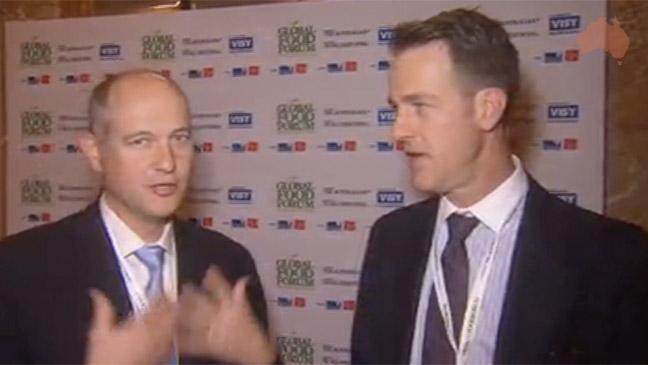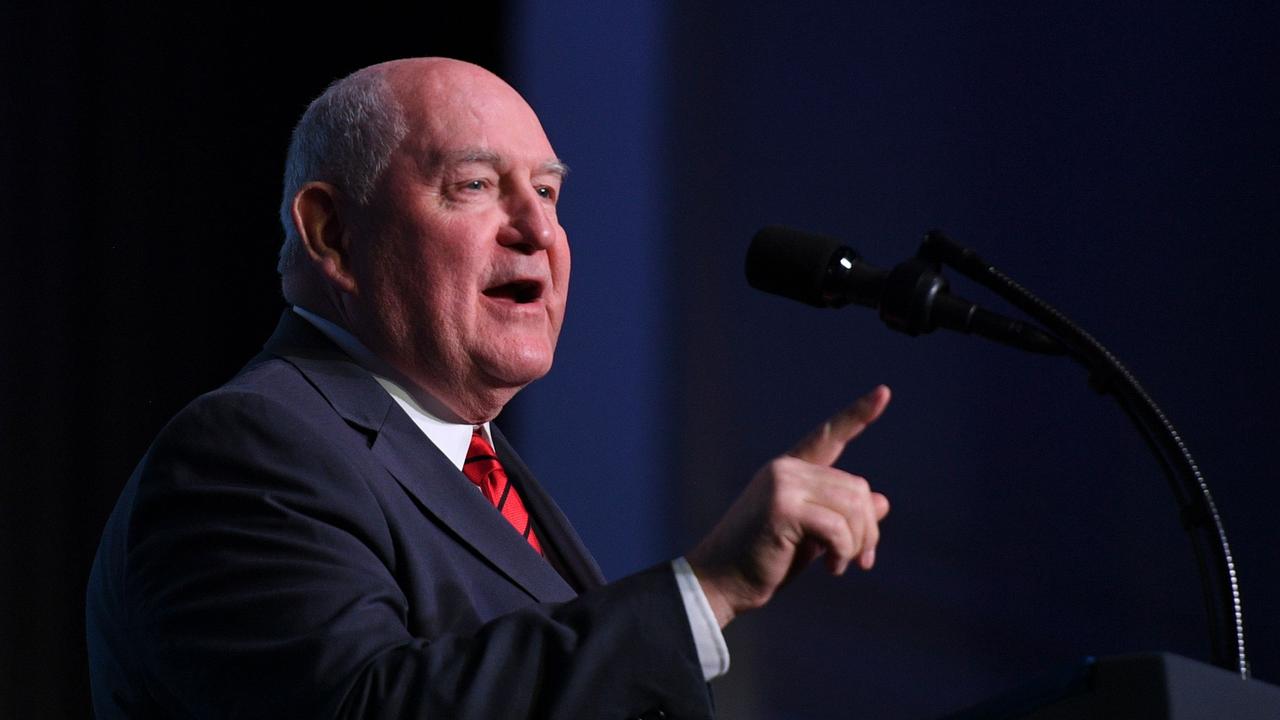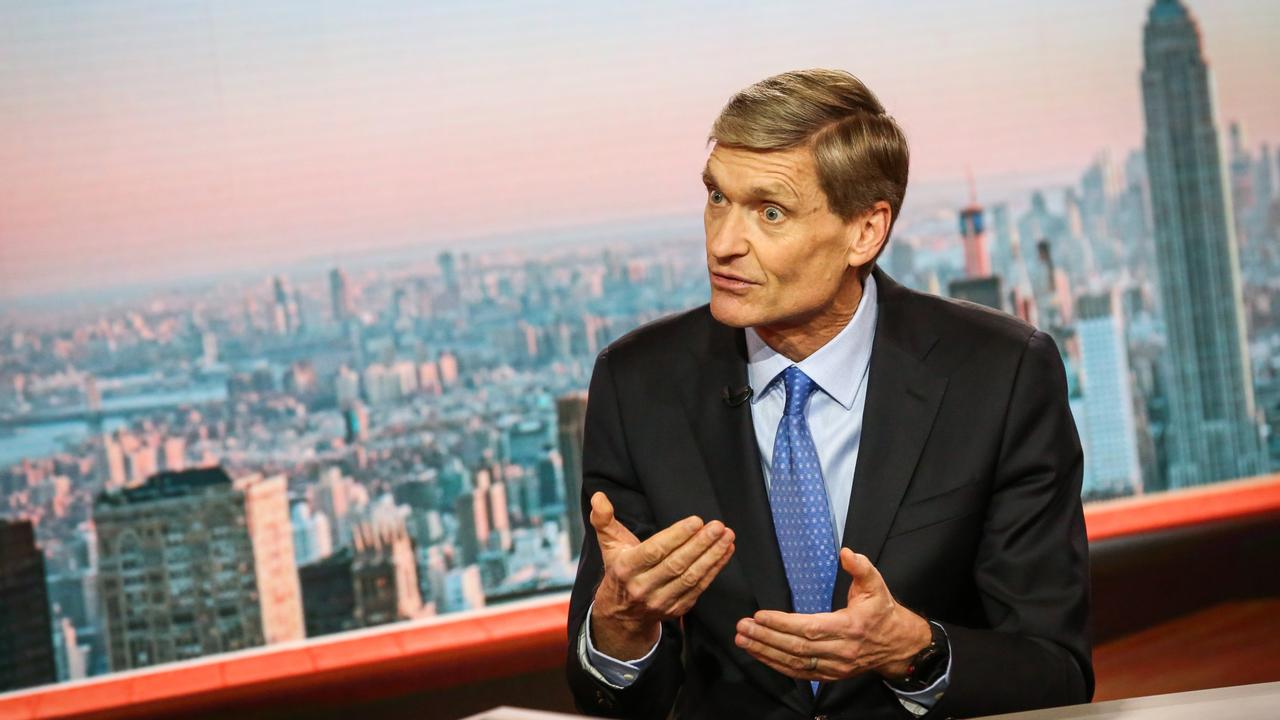BLOG: Global Food Forum - Australia's place at the table
The Australian brings you all the key points and interesting asides from the Global Food Forum in Melbourne.

During this year's Global Food Forum key leaders and industry experts debated the opportunities and challenges Australia faces to meet the growing Asian demand for food and become the food bowl of the region.
The Australian's Chief Opinion Editor Nick Cater was there to bring you the key points and interesting asides from the conference floor in Melbourne.
DENIS NAPTHINE: Growing food exports into Asia
5.26pm
I joined Stephen Loosley on stage for the concluding session to attempt to draw together the strands of the day's discussion.
It was a story of abundant promise - Anthony Pratt's notion of Australia as a food superpower is inspiring. But is also clear there is nothing inevitable about Australia's food bowl future, and the challenges of investment are substantial.
It is the old story: we are required to make our own luck.
4.45pm
Our salad days are ahead of us, if Julian Cribb is right.
“We are not going to be eating the same things at the end of the century in a 4 degree warmer world,” he predicts.
4.11pm
Martin Cole, head of the CSIRO Food and Nutritional Science argues Australia should play to its natural strengths in innovation, science and technology Australia has made strides in nutritional science, food safety, and genetics that would allow us to engineer our dairy and grain industries to produce better, healthier food. In aquiculture too, Australia has made great strides.
What’s to stop us?
“We’re not going to get there without significant investment,” says Cole.
That’s a line that has been repeated many times in today’s discussions.
4.02pm
Food security is the focus of Stephen Loosley during a panel discussion on Policy and Politics. Food and politics are irrevocably linked, he says. The crisis on the Korean peninsula is flows from North Korea’s need to distract attention from famine.
“When you talk about food security this is an existential issue,” he says.
3.46pm
Farmers should stop talking down their own book because it is deterring investment, says Tim Hornibrook in the forum’s keynote address.
“Our’s is a sector with almost as many representative bodies as farmers,” the co-head of Macquarie Agriculture Funds Management said.
What is more, many insist on telling hard-luck stories in the hope of attracting public sector support. No wonder investors are wary:
“They’re often the first to say ‘you’re the people who have been saying what a terrible sector this is. And it is hard to argue with that.”
2.30pm
Visy director Ross Fitzgerald agrees that the big challenge is sourcing investment.
"How one raises a lot of money through co-ops is a really challenge," he said.
"This game is all about how one achieves economies of scale and attracts the very talent."
2.21pm
The paradox of Australia’s farming future is that while the growth in the market is certain, it is not matched by investment. Professor Zhangyue Zhou of James Cook University says the return on investment is simply too low to attract superannuation funds or individual Australian investors.
“It looks like foreign investment in agriculture is inevitable,” he told the conference.
But why? If returns are too small to lure domestic investment, why would foreign investors be mug enough to do so?
Foreign investors might be waiting for a future opportunities or trying to secure supplies for their countries for the future. Or then again, they could be setting up terrorist camp. We are right to be skeptical, says Professor Zhou.
Lunchtime special:
My book The Lucky Culture will be in the shops this weekend. In chapter two, I reflect on the frozen food industry, the high-tech food processing frontier of the late 19th century.
At today's conference, where technology and supply chains are a recurring theme, it is instructive to consider the can-do spirit that put Australia at the forefront of agricultural technology by the time of Federation.
In 1874, the wool trader Thomas Sutcliffe Mort established the New South Wales Fresh Food and Ice Company, and began building a freezing plant using ammonia compression technology at an abattoir in the Lithgow Valley, linked by rail to the plant already operating in Darling Harbour in Sydney. The following year he served lamb slaughtered fifteen months earlier at a dinner for 300 people:
"Yes, gentlemen, I now say that the time has arrived – at all events, it is not far distant – when the various portions of the earth will each give forth their products for the use of each and of all; that over-abundance in one country will make up for the deficiency of another. Science has drawn aside the veil, and invention has done the rest ...
"Where the food is, the people are not; and where the people are, the food is not. It is, however, as I have just stated, within the power of man to adjust these things."
The Lucky Culture is published by Harper Collins Australia. For more details go to www.luckyculture.com.au
12.23pm
But Schneiders rejects the accusation that the wilderness movement has prematurely closed the frontier.
"I'm not angling that Australia should be one big national park," he says.
"That would be a nightmare."
The conference breaks for lunch.
12.18pm
Schneiders rejects the comparison between northern Australia and other tropical areas.
"Australia has some of the most ancient and leached soils, some of the most porous soils, in the world," he says.
"Northern expansion is green field on a massive level.
"Australia is a green field on a massive level. Australia as we all know is an ancient country with ancient soils."
12.14pm
Senator Bill Heffernan gets to his feet to confront his foe, throwing the issue of climate change back at Schneider.
"If the science is 40 per cent right there will be zero allocation for farmers in the Murray Darling basis," he says.
Farming will have to move north.
12.10pm
Lyndon Schneiders, the national director of the Wilderness Society is in conversation for Geoff Elliott with a dissident view.
"What am I doing here? Good question."
Schneiders rejects the idea of developing northern Australia.
"Northern Australia is the wrong answer... I honestly believe that the future for your industry is in expanding and developing existing areas."
11.55am
Ian Halliday of Dairy Australiaspeaks of the succession issue in farming. How to persuade older farmers to hand the business on? He recalls a conversation with a farmer in Toowoomba who said: "I suppose I should start talking about succession issues, my son turns 60 next week."
11.50am
The big issues of urban encroachment and the conflict between farming and resources are raised. Duncan Fraser raises third issue – the expansion of natural parks, particularly in New South Wales. "Is it just to appease certain groups?" he asks. "It is affecting rural communities."
11.40am
Duncan Fraser says there are big issues in the short term for family-owned farms, but he still believes in the long run that is where the future is. A lot went under during the nine-year drought, but they are far from finished. There is room for optimism in the wool industry, which after the restructuring of the 1990s is now paying off. "It takes a lot of pain to get gains but it can be done," he says.
11.24am
Helou says Australian farmers are the lowest cost producers at the Farm Gate. The downside is they are not capturing the profit potential between production and consumption. Why?
First, downstream processing and marketing is in the hand of foreign-owned multinationals.
Second, the scale and capacity of Australian-owned food companies is limited. They haven’t kept up with technological development and have not made the footprint in development markets that European and other competitors have.
Third, there has been “less than adequate cooperation” between government and business. “I’m not looking for subsidies – we’re talking about good policy,” says Helou.
11.18am
The Australian’s Business Editor, Geoff Elliott, is chairing a discussion on the challenges at the farm gate. With him are Ian Halliday, managing director of Dairy Australia, Garry Helou, managing director of Murray Goulburn Co-operative, Angus Taylor, director, Port Jackson Partners and Duncan Fraser, president National Farmers’ Federation.
10.31am
Andrew Robb talks of "catalysing" opportunities in agriculture i. Or should that be "cattle-ising"? Perhaps he can throw some light on that during the tea break.
10.24am
Paul Kelly raises the issue of corporate consolidation in the agricultural sector and finds bi-partisan agreement. “I don’t have a philosophical problem with that,” says Craig Emerson. “We’re an oligarchical country,” says Andrew Robb. “That’s a fact of life. “But it does put a greater onus on a government to have a competition policy.” Emerson, a former economic advisor to Bob Hawke, will recognize the rhetoric of competition that Paul Keating brazenly stole as Labor’s own.
10.11am
"We are being flogged by New Zealand," says Andrew Robb. And he is not discussing gay marriage. Anthony Pratt agrees: "We can’t yet match Auckland’s FoodBowl centre... the truth is that we have not moved much beyond being Asia’s quarry."
10.10am
We are 97 minutes into the conference before Craig Emerson turns on the media, having shown admirable restraint up to now.
"This doesn't get proper discussion,"he says. "That means the media needs to share some of the criticism."
Paul Kelly graciously admits to "sins of omission", though Emerson admits the The Australian "is better than most".
10.07am
More on education from Andrew Robb: The highly centralised TAFE system in states other than Victoria renders us incapable of seizing the opportunities
10.05am
More than 25 per cent of the Australian workforce have a bachelor degree, or higher. The government wants to raise this cohort to 40 per cent by 2020.
Well yes, but what are they studying?
Pratt tells us only :750 students are graduating in agricultural science, yet there are over 4,000 vacancies in the food industry.
"I remember in the 1970’s, when I was growing up, ag science was harder to get into than medicine, because there were no places." he says.
9.59am
Food versus cars:
The decline in the food industry has had a bigger impact than the closedown of car factories, says Pratt. Yet political attention, and those dreaded subsidies, flows to the automotive industry.
"The irony is that we have a competitive advantage in food manufacture. We don’t have that competitive advantage in producing cars," says Anthony Pratt.
9.54am
Anthony Pratt's speech was particularly well-crafted. "We are often described as a middle power with global interests. "But when it comes to food, we have the potential to be a super-power. "The middle class in Asia is forecast to grow from 500 million to 3 billion consumers."
9.50am
Anthony Pratt: The Australian, this country’s indispensable newspaper, has led the national debate on so many vital issues since Rupert Murdoch launched it in 1964.
9.45am
Andrew Robb talks up the tropics. By farming our northern region, we will generate skills and expertise that can be exported to other tropical regions around the world, says the opposition finance spokesman and former Executive Director of the Cattle Council of Australia and later Executive Director of the National Farmers' Federation.
9.36am
Michael Jeffrey highlights two environmental issues – the quality of our soil, and our attitude to water.
The former governor general says we need to “fix the paddock where it is in trouble”. “Sixty per cent our landscape is degraded in some form or another,” he says, with rivers and water courses in an equally deplorable state.
He provides an interesting perspective on water management: for every 100 drops of rain that falls, 10 run into rivers, 2 into dams and 2 into run off.
Collecting the other 86 drops in some form is the challenge, he says. By improving the soil, it can be absorbed before it is evaporated. We need to fix the evaporation problem, he says.
9.21am
Visy executive chairman Anthony Pratt tells us that Australia already provides food for 50 million people beyond our shores. He should know – 70 per cent of his company’s business involves wrapping, packaging and bottling food and beverages.
He says the potential is far greater: “When it comes to food we have the potential to be a superpower,” he says. To do so, however, will require “a coalition of the willing.”
9.08am
Welcome to the Global Food Forum: Finding Australia’s Place at the Table – a one day conference bringing together food producers, entrepreneurs, journalists and policy makers to discuss the opportunities that will emerge from the global expansion in demand for food. It is the second in a series of conferences organised by The Australian, supported by The Wall Street Journal.
The Global Food Forum is a partnership with Visy with the support of the State Government of Victoria. News Limited CEO Kim Williams opened with an overview of the conference agenda. Its task, in a nutshell, is to discuss Australia’s role in supplying food to a worldwide market of 9 billion people – the predicted population of the world by 2050.
Victoria’s Premier Denis Napthine talked up the food-producing credentials of his state. Thirty per cent of Australia’s food output comes from the Garden State, using just 3 per cent of the Australian land mass. But for how much longer? Will the fulcrum of agricultural production tilt to the north, with the future expansion of the tropics? That will be one of the big underlying themes of discussion here today.



